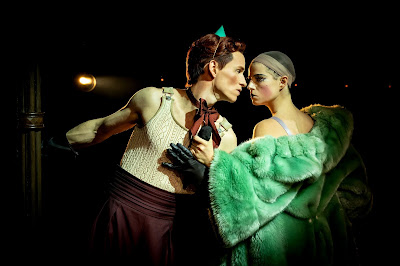Playhouse Theatre, London
*****
Music by John Kander
Lyrics by Fred Ebb
Book by Joe Masteroff
Directed by Rebecca Frecknall
 |
| Eddie Redmayne and Jessie Buckley |
In a remarkable transfiguration, London's Playhouse Theatre is ingeniously transformed by designer Tom Scutt to an in-the-round setting which after an equally imaginative pre-show mise en scene, goes a long way to transporting the audience to Berlin’s Kit Kat Club, the home of the show’s eponymous cabaret.
Rebecca Frecknall’s interpretation offers a bold take on the Kander & Ebb classic. The cabaret girls (“each and every one, a virgin”) are a chic metrosexual bunch, cleverly mixing 2021’s androgyny with Berlin’s famed inter-war decadence. The Kit Kat Club of course is a dive and rising from its deepest depths is the exquisitely ghastly Emcee, played in this iteration by Eddie Redmayne.
Cabaret’s Emcee is one of the most ingenious creations of late 20th century musical theatre. Almost like a Greek Chorus, or Lear’s Fool, he holds up a mirror to the Club’s audience (literally, in this staging, the theatre audience), parodying the hopes of the outside world (“Life is disappointing? Forget it”) while equally mocking the rise of Nazism and the persecution of the Jews. As Redmayne delivers If You Could See Her, the brutality of his satire chills to the bone. The actor is a tour de force throughout the piece such that when he is at times mute in the Finale, it only adds to the horrors that Germany as a nation will soon descend into.
Opposite the Kit Kat Club’s Emcee is of course the English cabaret artiste Sally Bowles. Jessie Buckley is sensational in her take on Bowles, bringing an understated haunting to the role. In her opening number Don’t Tell Mama, Buckley stuns with a polished insouciance that has the Kit Kat Club cheering for more. By the time the show is done however, and her Sally has both witnessed and experienced tragedy, Buckley’s take on the title number is breathtaking. Not for her the Broadway bravado of the song that one may perhaps associate with Liza Minnelli - rather, a delivery of Kander & Ebb’s signature tune that shows the singer to be broken and vulnerable. It is a stunning realisation of the song that shocks both in its despair and in quite how powerfully Buckley inverts the number’s traditional style into something far more poignant and haunting. I doubt that there will be a stronger performance to be found on London’s musical theatre scene for quite some time.
Redmayne and Buckley are surrounded by talent. Omari Douglas’ Clifford Bradshaw, a naïf to Berlin and the foil to the story’s piercing arc is assured and credible in his role. When late in the second act he is beaten up by Nazi thugs, there is a multi-faceted angle to the hate that he is subject to. Liza Sadovy as Fraulein Schneider, Berlin’s world-weary landlady, is gifted a number of musical opportunities, in which she shines, and her story too offers a sad wry glimpse into the country’s looming thunderstorm of fascism.
Fraulein Schneider’s two other tenants are the Jewish grocer Herr Schultz (Elliot Levey) and prostitute Fraulein Kost (Anna-Jane Casey). Kander, Ebb and Joe Masteroff had a challenge in writing Schultz - as they sought to capture his pride in his German citizenship alongside his love for Schneider, while at all times keeping him wilfully blind to how the fate of German Jewry was to play out. It would have been easy to make Schultz a more soft and sentimental sop, but he is written (and here, played) perceptively, such that his future murder, that as a Jew he will likely face, plays out only in our minds, rather than on stage.
Casey is magnificent as Fraulein Kost, a small character who so skilfully depicts both Berlin’s depravity and its desperation. The gusto with which Kost joins in with Tomorrow is one of the most outstandingly simple depictions of the appeal of Hitler’s National Socialism to much of the German population.
Stewart Clarke’s Ernst Ludwig is the musical's face of Nazism, with Clarke cleverly capturing the ugliness of his role, at all times avoiding cliche and melodrama. As he leads the end of the first act with Tomorrow, it is a chastened and shocked audience that head out for their interval beers and ice-creams.
Jennifer Whyte’s musical direction of her 9-piece orchestra that boldly spans the auditorium is adroit, with Kander’s melodies being richly served. All her musicians are magnificent, but the guitar/banjo work from Sarah Freestone together with Matt French’s percussion are particularly distinctive and memorable.
With antisemitism again manifest on the streets of London, Cabaret has never been more relevant.
Booking until 1st October 2022
Photo credit: Marc Brenner
No comments:
Post a Comment